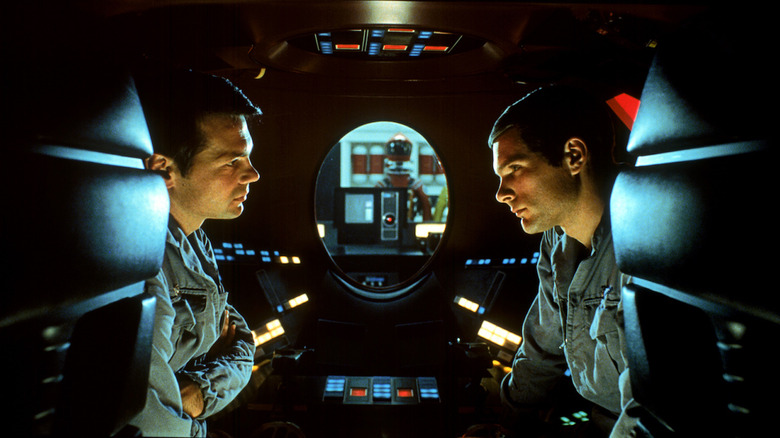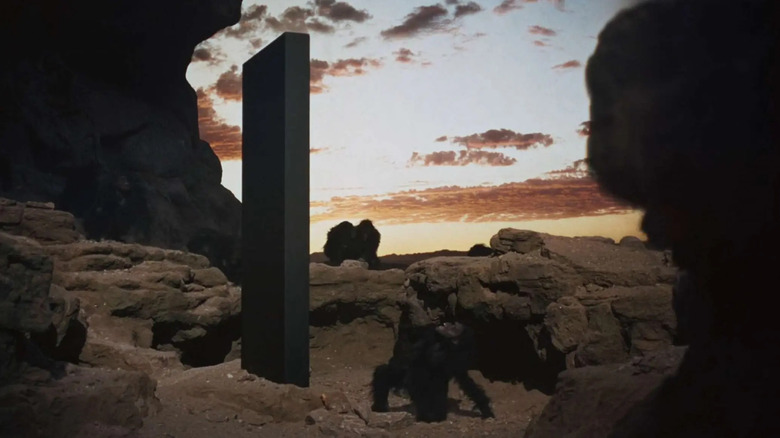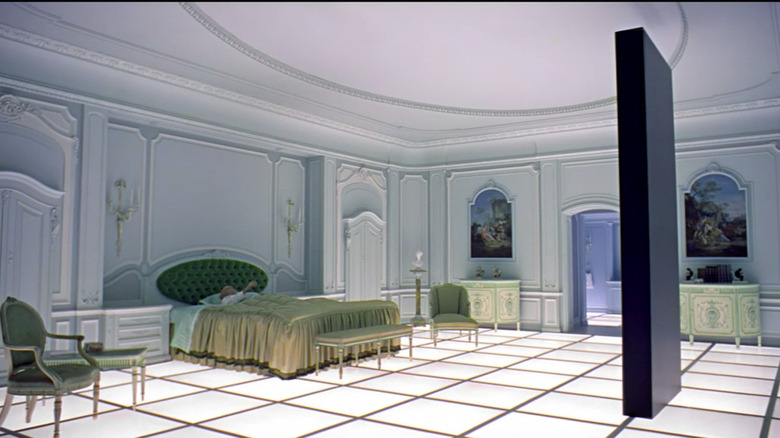For Stanley Kubrick, 2001: A Space Odyssey Was Far From Science Fiction
It's been just over 50 years since "2001: A Space Odyssey" transported audiences into the visionary mind of futurist Arthur C. Clarke and director Stanley Kubrick. To this day, the film remains a touchstone of science fiction cinema, influencing an ever-widening range of films that include everything from Marvel's "Eternals" to "The Silence of the Lambs." Although admiration wasn't exactly the sentiment the 200 people who walked out of the film's premiere in 1968 expressed. But regardless of that initial distaste, it's the stellar ambiguity of the film that has inspired endless conflicting interpretations. That's even after the director gave his own explanation for its enigmatic ending.
Clarke, who helped write not only the script but the novel alongside Kubrick, also had reverence and faith in the director's ability to bring the vivid imagery to fruition. That's something Kubrick indelibly accomplished, if the near five-minute stargate sequence is anything to go by. Apart from his own iconoclast status and innovative techniques as a filmmaker, Kubrick clearly saw something unfathomably gripping in Clarke's writing. So it probably makes sense that the "Dr. Strangelove" director had his own inklings that we aren't exactly alone in the universe.
Kubrick saw extraterrestrials as a statistical certainty
In his behind-the-scenes account "The Lost Worlds of 2001," Clarke detailed his experience working with Kubrick on the script and bouncing ideas off him for the novel. But the author also reveals that when the director first approached him, he explained he wanted to make a science-fiction film that would "arouse the emotions of wonder, awe ... even, if appropriate, terror." Emotions I think we can all agree the viewer feels overwhelmed with throughout the movie, and especially at its end.
Which is why it's interesting to discover that perhaps Kubrick was looking to mirror his own reactions to the prospects of extraterrestrial life. Dust off a New York Times article from 1966 and you'll find Kubrick in his own words detailing his "Eureka!" moment:
"Somewhere along my wandering reading I came across some Rand Corporation statistics on the probability of life in outer space. The ABC's of these statistics are that our galaxy is made up of about a hundred billion stars, that each of these stars is made of the same chemical stuff as our own sun, and that planetary systems thus number in the billions, too. The latest thought on the probability of life in the universe has it that, given a stable planet somewhere between fire and ice – planets like Jupiter are too cold and those like Mercury are too hot–the likelihood would be that life would arise spontaneously. The Rand Corporation estimated 640,000 earth-type planets in our own galaxy – planets so much like ours that you could step out of a space vehicle, take a deep breath of oxygenated air and look up at a blue sky. Most astronomers and other scientists interested in the whole question are strongly convinced that the universe is crawling with life; much of it, since the numbers are so staggering, equal to us in intelligence, or superior, simply because human intelligence has existed for so relatively short a period."
It's a cold but oddly exciting realization: the crushing size of the cosmos and the imperceptibly large probability it harbors life other than our own. Kubrick felt some sense of it when he read those numbers from The Rand Corporation, much the same way I will the next time I fall down a rabbit-hole of YouTube videos or Wikipedia links dealing with all things aliens. Whether or not humans will actually ever come into contact with life outside of our solar system is another question entirely, but it's clear the mere imagination of what that contact would look like, what it would mean for our world, had an effect on Kubrick.
But that wasn't the only sign for the director that a movie like "2001: A Space Odyssey" needed to be made. At one of his meetings with Clarke, something altogether strange occurred in the skies above them.
Clarke and Kubrick spot a UFO
In his making-of book about the film "Space Odyssey," author Michael Benson gives an incredible account about Clarke and Kubrick spotting what both believed to be a UFO:
"After shaking hands on their deal, or at least their intention to negotiate one, Clarke and Kubrick repaired to the patio. They had established a real rapport over the past month, and any guardedness had long since dropped. Both were excited and didn't mind showing it...Suddenly they noticed a brilliantly bright, unwavering point of white light rising above the horizon in the southwest. Radiant as a navigational beacon, it climbed steadily in the night sky. Clarke had seen the Echo 1 satellite from Ceylon many times, but this object seemed far brighter. After about five minutes, it had climbed to the absolute zenith of the sky–and there it appeared to stop. A sense of awe and exhilaration filled both of them. 'It's impossible,' Clarke sputtered. 'At its closest point, an artificial satellite has to be moving at its maximum apparent speed!' A thought flashed through his mind: 'This is altogether too much of a coincidence. They are out to stop us from making this movie.'"
We imagine Clarke making his remark sarcastically, but with hidden belief in at least the minute possibility. Luckily aliens did not descend "Independence Day" style to stop the two from creating the film — although maybe that was them staging walkouts on premiere night?
For the real razor-sharp skeptics in the room looking at this anecdote like it has "P.R. stunt" written all over it — maybe if this happened today, absolutely. But given how schismatic the film's material already was and is, it's unclear how much the anecdote would help. The only people who'd believe two men making a movie that features extraterrestrials saw a UFO are people who also entertain the possibility of their existence. And believe both Kubrick and Clarke did — as evidenced by their hauling of a telescope to the roof to get a better look at the curious object in the sky.
What did they see? Flying saucer or alien monolith?
Of course, Kubrick had a brand-new Questar telescope, probably for research, but also no doubt to impress fellow star-gazer and UFO spotter Clarke. After placing the telescope atop the building's roof both men took a peek into the eye-piece hoping to see something spectacular. As Benson writes:
"Fumbling with knobs, the tripod planted on roof tiles, Clarke managed to get it into the telescope's field of view. It remained, however, simply a brilliant point of white light, with no visible dimensions. They took turns viewing it as it gradually descended toward the northeast, passing through Ursa Major–the Great Bear–before finally winking out in the horizon's haze. The whole episode had lasted no longer than ten minutes. 'That's the most spectacular of the dozen UFOs I've observed in the last twenty years,' Clarke said, his voice wavering. Descending excitedly back into the living room, they located the New York Times and paged back to the Visible Satellites table the paper had started printing a few years before. In the early 1960s NASA had launched a pair of gigantic inflatable satellites meant to serve as passive reflectors of microwave and communications signals. Echo 2, launched into a polar orbit on January 24, 1964, was 135 feet in diameter and surfaced in bright reflective aluminum. But no transit was given for it at nine o'clock at night–though the slightly smaller Echo 1 was listed as passing overhead at eleven and then again at one in the morning."
If you're disappointed they didn't see a flying saucer, floating monolith, or giant glowing space fetus — I feel your pain. But sometimes it's a blessing life doesn't literally imitate art when it comes to a Kubrick film (looking at you "A Clockwork Orange" and "The Shining").
Either way, what's crystal clear is that the incident had a bonding effect on the already increasingly chummy duo of Kubrick and Clarke. Their shared passion in creating a film that realistically and seriously imagined humanity's first contact with life other than our own is the reason "2001: A Space Odyssey" remains so enduringly captivating.
Now that we know Denis Villeneuve will be tackling another Clarke adaption with "Rendezvous with Rama" it asks the question: does the "Arrival" and "Dune" director believe in aliens? As fate would have it, he does.



